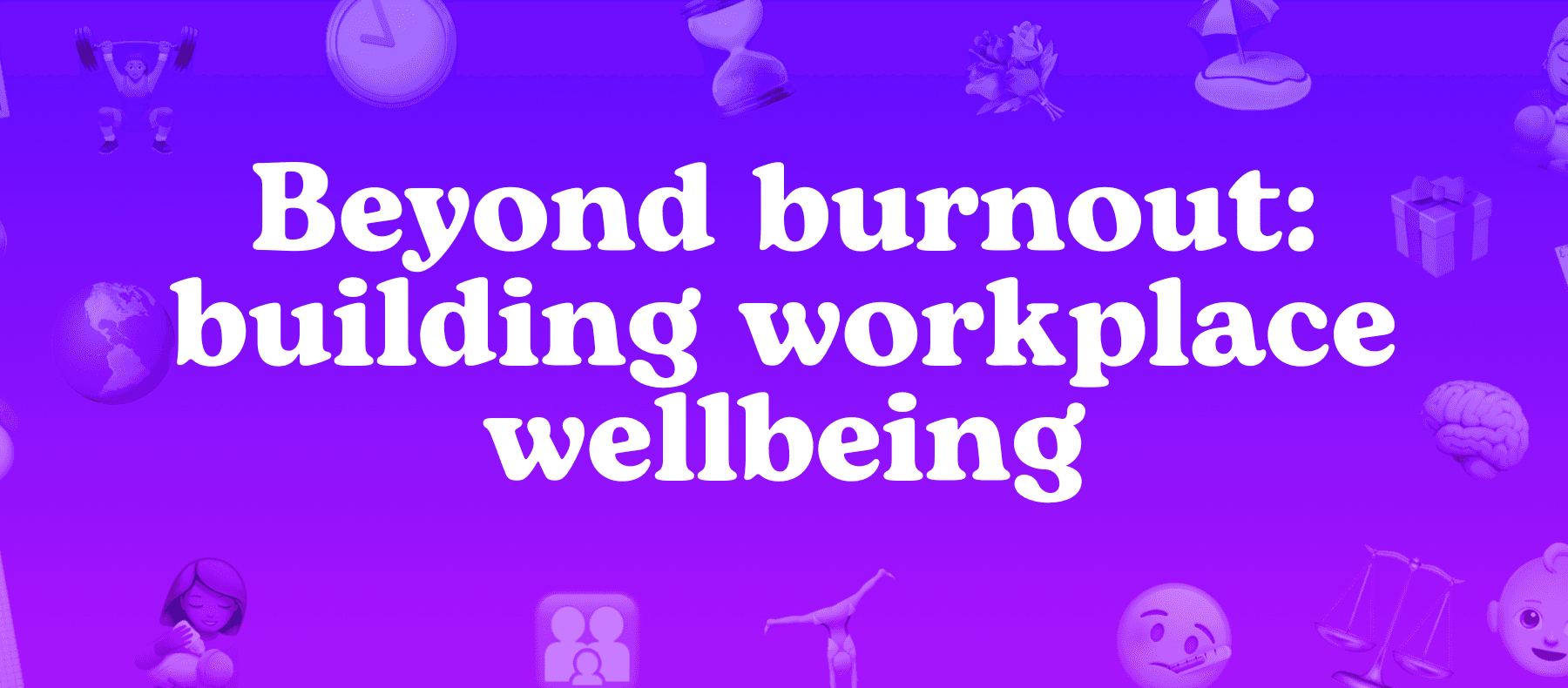Beyond burnout: building workplace wellbeing
As employees deal with increasing challenges and stress, it's important for managers and HR teams to have the know-how and tools to support their team's mental health and wellbeing.
8th May 2024

To dig deeper into this important issue, we hosted a webinar with Kenny, the Head of Commercial Growth at Oliva, Europe's leading mental wellbeing platform. Joined by Beth, Head of Growth at Flexa, the duo shared their insights and experiences on navigating mental health and burnout in the workplace.
In this blog we will look at :
- Understanding burnout: more than just workplace stress
- The role of managers: responsibility vs. accountability
- Spotting the signs: early intervention and support
- How to build a culture of openness and support
- Practical tips and resources for HR teams
Understanding burnout: more than just workplace stress
One of the key takeaways from the discussion was the evolving definition of burnout. Kenny highlighted that burnout is no longer solely attributed to the workplace, as it was previously defined by the World Health Organisation. Instead, it has become a more complex and multifaceted issue, often blurring the lines between work and personal life.
Burnout, as Kenny explained, occurs when individuals reach a point of detachment or start exhibiting symptoms caused by prolonged stress. This stress can stem from various sources, including work, home life, and the overall challenges of navigating today's fast-paced world.
The role of managers: responsibility vs. accountability
When it comes to addressing mental health and burnout in the workplace, the role of managers is crucial. However, as Beth and Kenny discussed, it's essential to distinguish between responsibility and accountability.
Drawing a parallel to physical health, Kenny emphasised that while employees are ultimately accountable for their own well-being, managers have a responsibility to create a supportive environment. Just as an individual is expected to take care of a broken leg, employees should be empowered to prioritise their mental health.
Managers, on the other hand, are responsible for creating a culture that promotes open communication, provides necessary resources, and supports employees in their mental health journey. By striking this balance, organisations can create a healthier and more resilient workforce.
Spotting the signs: early intervention and support
One of the challenges of addressing mental health and burnout is recognising the early signs. Beth and Kenny talked about the importance of managers being attuned to changes in their team members' behaviour, work quality, and overall demeanour.
Kenny highlighted the value of having a strong connection with employees, which allows managers to notice when someone may not be themselves. This could manifest in changes in work rate, quality, or even subtle cues like the length and tone of their messages.
By being proactive and checking in with employees when these signs arise, managers can create a safe space for open conversations and early intervention. It's crucial to approach these discussions with empathy and genuine concern, rather than judgement or criticism.
Building a culture of openness and support
Throughout the webinar, Beth and Kenny emphasised the importance of creating a workplace culture that normalises conversations about mental health and burnout. This requires a multi-faceted approach, including:
1. Leading by example: Managers and leaders openly discussing their own challenges and prioritising self-care.
2. Encouraging open communication: Regularly checking in with employees and creating safe spaces for honest conversations.
3. Promoting vulnerability: Acknowledging that everyone, including leadership, is on a journey of growth and improvement.
4. Celebrating the right things: Focusing on employee well-being and sustainable performance, rather than glorifying overwork and burnout.
By creating a culture of openness and support, organisations can break down the stigma surrounding mental health and create an environment where employees feel valued, heard, and empowered to prioritise their well-being.
Practical tips and resources for HR teams
Throughout the webinar, Beth and Kenny shared practical tips and resources for managers and HR teams looking to support their employees' mental health and prevent burnout. Some key takeaways include:
1. Regularly checking in with employees through one-on-one meetings, team stand-ups, and informal conversations.
2. Utilising tools like personal user manuals or "Manuals of Me" to better understand individual working styles, preferences, and boundaries.
3. Providing support and resources, such as access to mental health professionals, employee assistance programs, or well being platforms like Oliva.
4. Encouraging open conversations about mental health and burnout, and actively listening to employees' concerns and feedback.
5. Promoting work-life balance and encouraging employees to prioritise self-care and set healthy boundaries.
By introducing these strategies and continuously learning and adapting, managers and HR teams can create a more supportive and resilient workplace culture.
How to embrace mental health as a priority
As the world of work continues to change, it's clear that prioritising mental health and preventing burnout is no longer a nice-to-have, but a must-have for organisations. By embracing this shift and equipping managers and HR teams with the knowledge and tools to support their employees, we can create healthier, happier, and more productive workplaces.
The insights shared by Beth and Kenny serve as a powerful reminder that we all have a role to play in destigmatising mental health and creating a more supportive and compassionate work culture. .